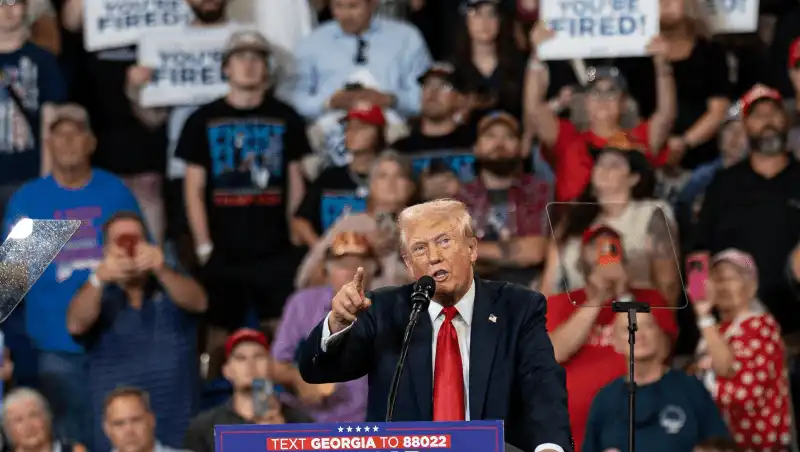Trump—Vance Housing and Tax Policy Proposals to Watch

Housing emerged as a key issue for many voters in the presidential election. During the September debate between Kamala Harris and Donald Trump, housing affordability was highlighted in response to the evening’s first question on the economy. Throughout the campaign, both candidates voiced support for easing the process for developers to build, though their strategies for tackling the nation's housing challenges were notably different.
Now, as Donald Trump returns to the White House, the Trump—Vance proposals have the potential to reshape the real estate landscape. This blog explores the possible impacts of these policy proposals, assessing their potential benefits and trade—offs. With major housing and tax reforms on the horizon, we’ll examine how these changes could impact real estate owners, homeowners, investors, and landlords.
Key Tax and Housing Policy Proposals: What Could Change?
On the housing side, a key focus of Trump’s platform was unlocking federal lands for new development. Tax—wise, an important consideration for the single—family rental (SFR) industry is the 2017 tax cuts, which are set to expire in 2025. Trump is expected to advocate for extending these cuts and may propose additional policies aimed at further reducing taxes.
Though Trump has not yet offered specifics on all his policies, several major initiatives have emerged that could have significant implications for the real estate market. We have identified five in particular:
- Extension of the Tax Cuts and Jobs Act of 2017 (TCJA)
- Tax exclusion on certain types of income
- Domestic manufacturing
- Immigration
- Corporate ownership of housing
Let’s break down each of these initiatives to understand their potential impact.
1. Extension of the Tax Cuts and Jobs Act of 2017 (TCJA)
The TCJA, enacted under Trump’s first term, brought significant changes to the tax landscape, including new deductions, changes to depreciation, and tax cuts for businesses and individuals. For landlords and real estate investors, this reform has been key to managing tax burdens, particularly with changes to corporate tax rates and business deductions.
As the TCJA is set to expire in 2025, Trump has proposed extending many of its provisions, including individual income tax rate cuts, the estate tax exemption, and tax cuts for corporations. For most individual landlords, the direct impact of lower corporate tax rates might be minimal unless they operate through corporations, where lower rates could boost their bottom lines.
In addition to these main tax cuts, there’s the potential to increase the standard deduction, expand the child tax credit, and enhance the pass—through business deduction. For individuals claiming qualified business income from REIT dividends, the Qualified Business Income deduction could provide a positive impact here.
In summary, President Trump has vowed to extend all the tax cuts enacted over the past seven years. He has also suggested that he would reverse the SALT (State and Local Tax) deduction cap, a contentious aspect of his 2017 tax reform, which limited Americans’ ability to deduct state and local taxes on their federal returns to $10,000. This change would have a greater impact on higher—income homeowners in high—tax states like New York, New Jersey, California, and Texas, while potentially being less relevant to the broader SFR market.
2. Tax Exclusion on Certain Types of Income
Another widely discussed proposal in the 2024 election was the exclusion of taxes on certain types of income, such as tips and overtime pay. The initiative is particularly important for states with significant service economies, like Nevada and Florida, where workers often rely on tips for a large portion of their income. If this measure passes, it could provide a financial boost to renters in service—heavy industries, particularly in cities like Las Vegas and Orlando, where a substantial portion of the renter base relies on tips for their livelihoods. This could improve their ability to pay rent, potentially driving up demand for rental properties.
Additionally, Trump has suggested limiting, or perhaps eliminating, taxes on Social Security benefits, which could lead to more discretionary income for seniors and retirees. This would likely benefit landlords, increasing the pool of renters who can afford housing.
While these changes could stimulate spending in some sectors of the economy, their long—term effect on real estate remains uncertain, especially if employers adjust their compensation structures to offset tax exclusions.
3. Domestic Manufacturing
Trump has long advocated for bringing manufacturing jobs back to the U.S. His stance includes tariffs and incentives aimed at boosting domestic production. From a real estate perspective, this could create local economic growth, especially in regions that attract new manufacturing plants.
For real estate investors, the impact of this initiative depends heavily on where the manufacturing jobs land. If Trump’s policies result in new manufacturing hubs in areas where investors have property, they could benefit from stronger local economies, higher wages, and potentially higher demand for housing. However, if the new jobs are located outside of an investor’s portfolio, the benefits could be less tangible.
4. Immigration
A central pillar of the Trump—Vance campaign was the push to curb illegal immigration and implement mass deportations of undocumented non—citizens. Vice President—elect JD Vance has suggested that this could lead to lower housing prices, though there is no clear evidence to support this claim.
Some policy experts have also warned that the opposite effect could unfold. They argue that this approach might drive up labor costs and cause delays in the construction industry, as immigrants make up approximately 30% of the workforce, according to the National Immigration Forum.
5. Corporate Ownership of Housing
Throughout the campaign, both candidates criticized large corporate investors in housing. However, Vance, in particular, has voiced strong opposition to the increasing presence of institutional investors in the housing market, arguing that corporate buyers are pushing out individual homebuyers and driving up prices.
Many experts argue this perspective is flawed. They highlight the benefits these investors bring, such as injecting capital into the market, rehabilitating dilapidated homes that individuals may avoid, and, most significantly, providing rental opportunities for those unable to afford down payments.
It is still uncertain how Trump will address this issue. On one hand, there has been considerable discussion about opening federal lands to stimulate housing development, with build—to—rent projects potentially playing a key role in increasing inventory amid a supply shortage that is driving up prices. However, given the criticism of institutional investors, Trump may look into imposing restrictions on corporate ownership. Any policies introduced could alter the dynamics of the real estate market, especially within the SFR sector.
Conclusion: What Does This Mean for the Housing Market?
The Trump—Vance policies are poised to have a major impact on the real estate landscape. For landlords and real estate investors, key factors to monitor include changes in tax policy, potential shifts in rental demand due to adjustments in income taxation, and the effects of corporate ownership on housing supply and prices. While many aspects remain uncertain, one thing is clear: Trump’s agenda will play a significant role in shaping the future of American real estate.
For a continued exploration of this topic, be sure to watch our exclusive webinar with Flock Founder & CEO Ari Rubin, “Trump & Vance Housing and Tax Plan: What Landlords Need to Know.” Tune in here.
.svg)
.avif)



.png)

.svg)